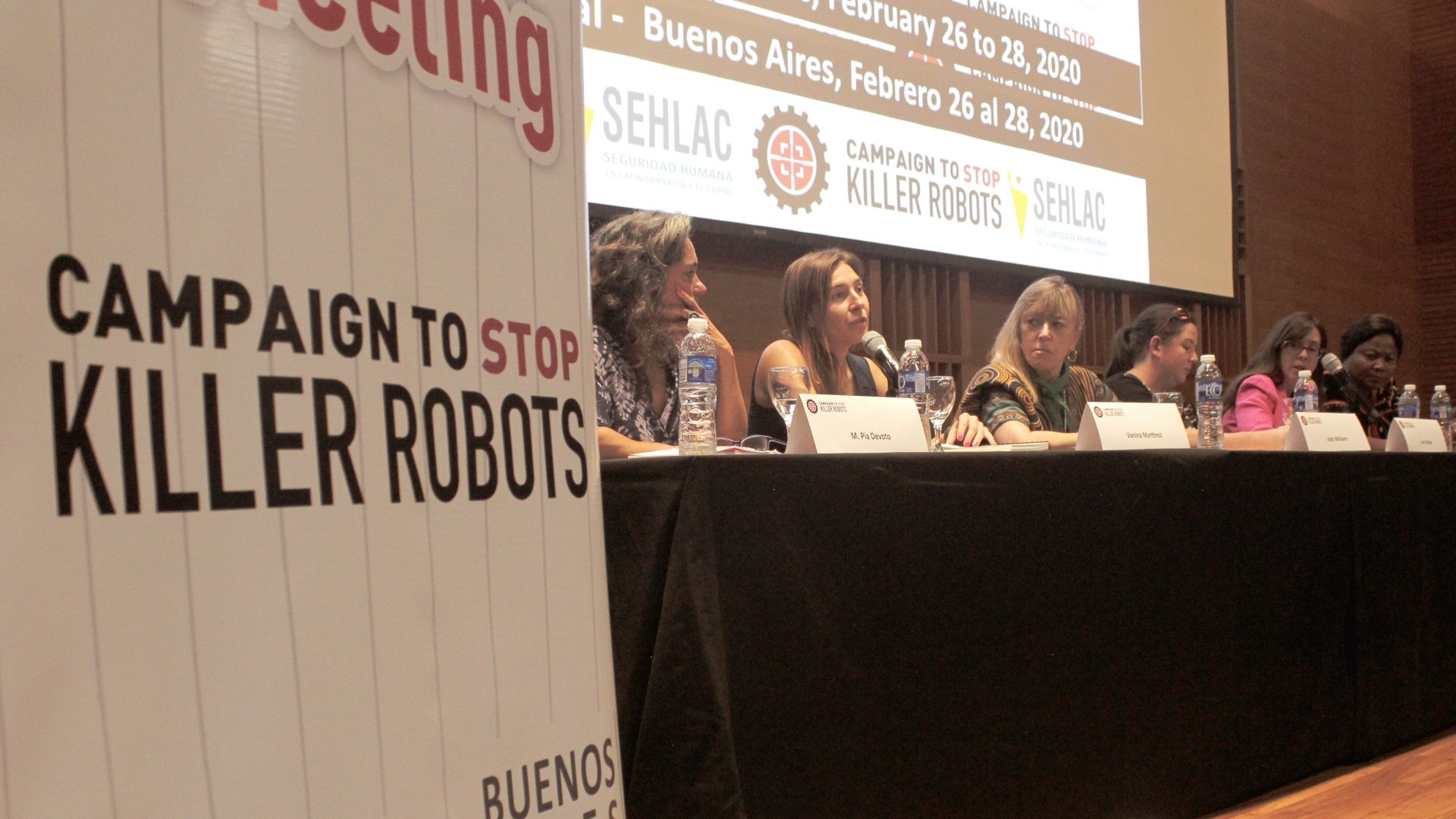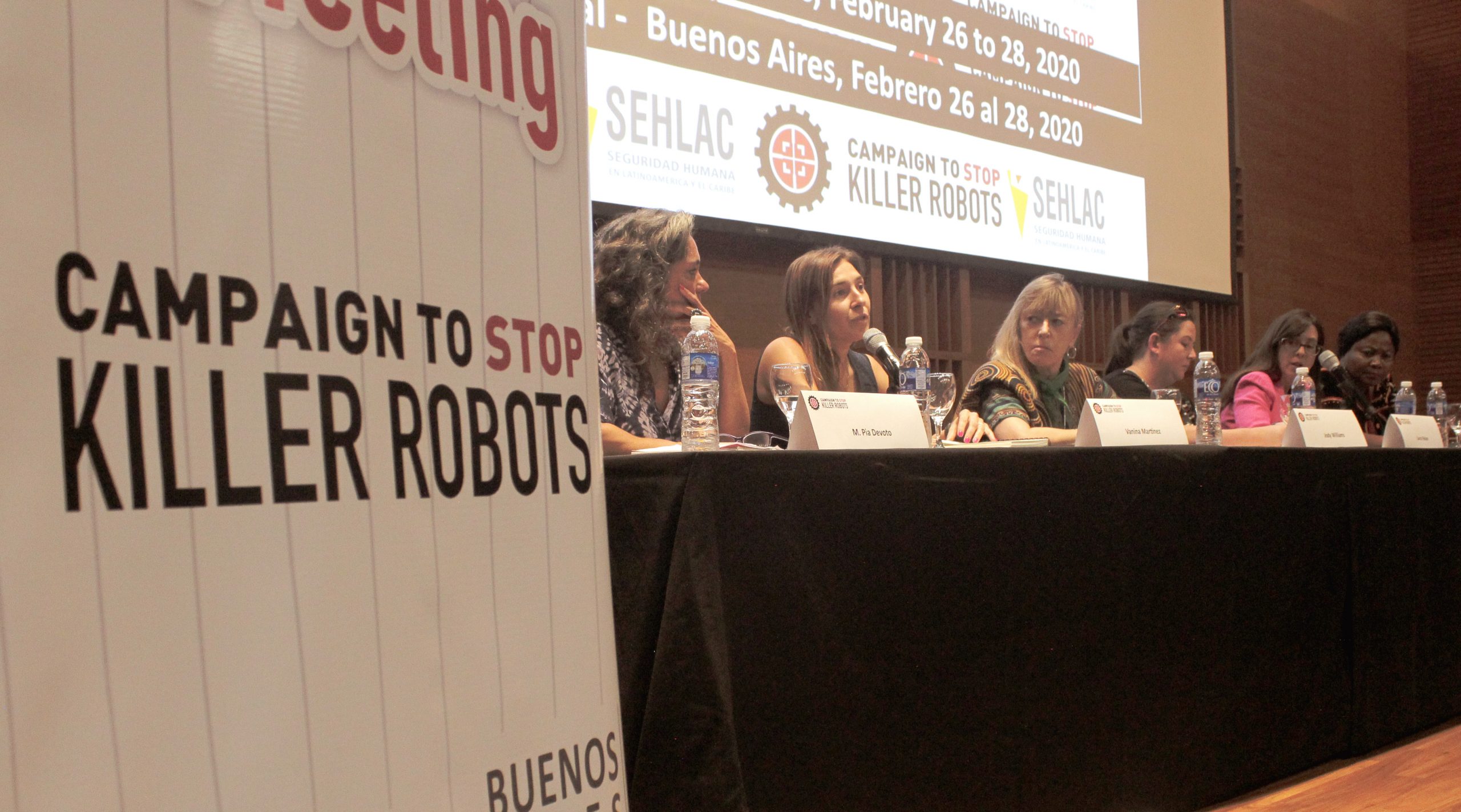
Global meeting in Buenos Aires

The Campaign to Stop Killer Robots held its second global meeting in Buenos Aires, Argentina on 26-28 February 2020. More than 80 campaigners from 35 countries participated in the meeting hosted by Asociación para Políticas Públicas (APP), a member of SEHLAC, the Human Security Network in Latin America and the Caribbean that is on the Campaign’s Steering Committee.*
The Campaign held a series of public events on Wednesday, 26 February, starting with a press conference featuring an all-female speaker line-up of Nobel Peace Laureate Jody Williams, SEHLAC coordinator María Pía Devoto of APP, tech expert Laura Nolan from ICRAC, Sylvie Ndongmo from WILPF Africa, and Argentine researcher Vanina Martínez. The press briefing closed with the signing of a cooperation agreement between the Campaign and the Argentinian Scouts organization.
Speakers at the briefing outlined gender and other concerns raised by removing meaningful human control from the use of force, noting the potential for fully autonomous weapons to exacerbate existing systems of inequality and oppression and to be used to perpetuate gender-based violence. The speakers appealed for leadership from newly-elected government of Argentina and other countries of Latin American to help launch negotiations on an international treaty to ban fully autonomous weapons.
The Campaign held a public seminar that afternoon with scientists and researchers from Latin America and Spain that drew attention to the appeals from technological experts urging a ban on lethal autonomous weapons. This includes the open letter launched at the 2015 International Joint Conference of Artificial Intelligence in Buenos Aires and signed by Stephen Hawking, Elon Musk and other luminaries. The Campaign also held a public event with campaigners from across the world who drew attention to serious ethical, legal, and other concerns raised by killer robots as well as the need for a feminist and youth inclusive approach.
Campaigners gathered in the evening at Plaza de Mayo, one of Argentina’s most iconic landmarks, where members of the public mark national holidays and hold demonstrations. This is also location used by the “Madres de Plaza de Mayo” mothers to protest the disappearances of their children during Argentina’s military dictatorship in 1976-1983. The visual stunt provided media with still photographs and video footage of the campaigners with their new robot mascot, “Maria” made by local artist Guillermo Simanavicius. Campaigners also recorded and uploaded their own video content using the Campaign’s newly-created “Stop Killer Robots Studio” app produced by Crew Studio.
Argentina’s Ministry of Science and Technology provided the Campaign with an appropriate venue for the global meeting on 27-28 February: the Centro Cultural de la Ciencia (Science Cultural Centre) museum and visitors center, which opened in 2015. The global meeting focused on substantive matters such as the common elements of our desired ban treaty and the pathways for achieving that goal. It included practical workshops aimed at supporting national and regional campaigning initiatives.
During the week, a small delegation of campaigners held meetings with Argentina’s Minister of Defense Agustín Oscar Rossi, Vice Minister of Foreign Affairs Ambassador Pablo Tettamanti. The delegation met with Senator Jorge Taiana and Senator Dalmacio Mera, chairs of the Senate’s foreign relations committee. Jorge Taiana and Dalmacio Mera. The Senate even issued a proclamation welcoming the Campaign’s global meeting and presence in the Argentina!
The global meeting also featured a session with diplomats from Argentina and Paraguay to discuss engaging with governments that share our desire for a new international ban treaty. The frank exchange looked at the limitations and constraints of the current diplomatic talks at the Convention on Conventional Weapons (CCW) as well as strategies for negotiating a ban treaty elsewhere.
Prior to the global meeting, campaigners from Article 36, Human Rights Watch and SEHLAC participated in the Rio Symposium on Autonomous Weapons Systems in Brazil on 19-20 February. One highlight was Austria’s announcement that it will hold a multilateral meeting on killer robots in Vienna in February 2021, while Japan announced it will convene a regional one on 2-3 December.
Steering Committee members who participated in the global meeting praised its smooth organization, positive atmosphere, focus on substance, and creative contributions. The global meeting participants were tremendously engaged and left Buenos Aires highly motivated to continue their work. This shows how the global meeting and associated events were well-conceived and executed.
The Campaign to Stop Killer Robots is grateful to the Buenos Aires ground team who organized the global meeting and events, namely Maria Pía Devoto (team leader), Candelaria López (logistics), Marisa Otamendi (communications), Ignacio Uman (media), Gaston Lacorte (political meetings), Jose Luis and Marín and Lucas Orellano (photos and videos), Guillermo Simanavicius (robot artist) and Ricardo Oscar Rodriquez (Argentine scientist). The Campaign acknowledges the hard work that the staff team put into the global meeting and is grateful to Farah Bogani, Clare Conboy and Isabelle Jones.
Several new publications were distributed at the Campaign’s global meeting:
- A PAX report entitled “Conflicted Intelligence” examines the role of universities in assisting militaries and defence contractors to develop technology that contributes to autonomous weapons;
- A Centro Delàs de Estudios por la Paz report on “Drones armados y drones autónomos,” also available in English;
- An updated Campaigner’s Toolkit with new chapters by Hayley Ramsey Jones on intersectionality and racism, John MacBride and Lode Dewaegheneire on engaging military personnel, and Clare Conboy on media work;
- The Campaign’s Medium blog on “Killer robots, feminism… and a feminist foreign policy?” by Erin Hunt of Mines Action Canada;
- Spanish translation of the Campaign’s desired treaty elements;
- Spanish translations of Human Rights Watch reports “Atender la llamada” and poster, “Construyendo el caso,” and “Cuidado con el vacío” and poster, in addition to the “Losing Humanity” report poster and the two-page overview on HRW publications on killer robots reports.
The global meeting attracted strong national media coverage in Argentina, including in these outlets:
Guido Vassallo, “Nos preocupa pensar que las armas autónomas decidirían quién vive y quién muere- Jody Williams,” Página/12, 26 February 2020.
Carolina Brunstein, “’La campaña contra los “robots asesinos’ llega a Buenos Aires con un reclamo al Gobierno,” Clarin, 26 February 2020.
María Alicia Alvado, “Arranca en Buenos Aires un encuentro contra el desarrollo de ‘robots asesinos,’” Telam, 26 February 2020.
Please see the full list of media coverage available here.
* Global meeting participants came from countries across the region (Argentina, Brazil, Canada, Chile, Colombia, Costa Rica, Guatemala, Mexico, Panama, Paraguay, Peru, Uruguay, and the United States) and around the world (Australia, Cameroon, Egypt, Finland, Germany, Hungary, Ireland, Italy, Japan, Kazakhstan, Kenya, Lebanon, Nepal, Netherlands, Nigeria, Norway, Pakistan, Russia, Spain, Sweden, Switzerland, and the United Kingdom).


